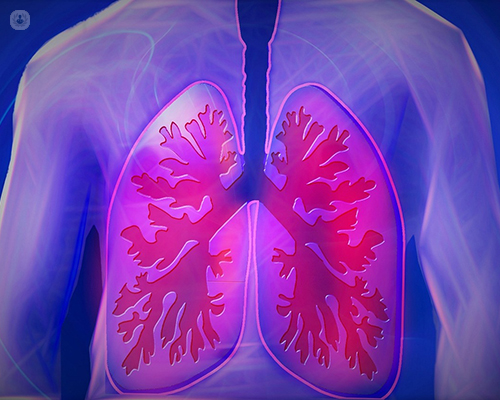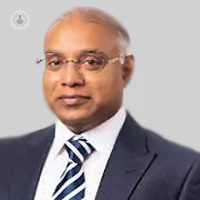A quick guide to lung cancer: Your questions answered
Written by:Lung cancer is a significant health concern worldwide, affecting millions of individuals each year. In this comprehensive guide, consultant respiratory physician Dr Enson Thomas explains some of the nuances of lung cancer, addressing common questions and concerns that patients may have.

How long can you have lung cancer without knowing?
Lung cancer often develops silently, with symptoms manifesting only in later stages. It's not uncommon for individuals to have lung cancer for years without noticing any signs. The duration varies greatly depending on factors such as the type of cancer, its location, and the individual's overall health. Regular screenings and awareness of risk factors can aid in early detection and improve outcomes.
What are the symptoms of lung cancer?
Symptoms of lung cancer may include:
- persistent coughing
- chest pain
- shortness of breath
- coughing up blood
- fatigue
- unexplained weight loss
- recurrent respiratory infections.
However, it's important to note that these symptoms can mimic other less serious conditions, which may lead to delayed diagnosis.
What are the causes of lung cancer?
Smoking is the leading cause of lung cancer, responsible for the majority of cases. Exposure to second-hand smoke, radon gas, asbestos, and other carcinogens also increases the risk. Additionally, genetics and family history play a role in predisposing some individuals to lung cancer.
How quickly does lung cancer spread?
The rate of lung cancer progression varies depending on factors such as the type and stage of cancer, as well as individual health factors. Lung cancer can spread to nearby tissues, lymph nodes, and other organs in the body. Early detection and timely treatment are crucial in preventing further spread and improving prognosis.
What treatments are available for lung cancer?
Treatment options for lung cancer depend on the type, stage, and overall health of the patient. They may include:
- surgery
- chemotherapy
- radiation therapy
- targeted therapy
- immunotherapy
- a combination of approaches
The goal of treatment is to remove or destroy cancer cells while minimising side effects and preserving quality of life.
How long can you live with lung cancer?
The prognosis for lung cancer varies widely and depends on factors such as the stage at diagnosis, the type of cancer, treatment received, and overall health of the patient. Early-stage lung cancer generally has a better prognosis than advanced-stage cancer. With advances in treatment and early detection efforts, survival rates for lung cancer have improved in recent years.
What can you do to reduce your risk of lung cancer?
- Quit smoking: If you smoke, quitting is the single most effective way to reduce your risk of lung cancer.
- Avoid second-hand smoke: Limit exposure to second-hand smoke, both at home and in public spaces.
- Test for radon: Test your home for radon gas, a known carcinogen that can seep into buildings from the ground.
- Protect against asbestos: Take precautions if you work in environments where asbestos exposure is possible, and follow safety guidelines.
- Maintain a healthy lifestyle: Eat a balanced diet, exercise regularly, and attend routine medical check-ups to maintain overall health.
Lung cancer is a complex disease with various factors influencing its development, progression, and treatment outcomes. Early detection through screenings and awareness of risk factors can significantly impact prognosis. By understanding the symptoms, causes, and treatment options for lung cancer, patients can make informed decisions about their health and well-being.
Dr Enson Thomas is a renowned consultant respiratory physician based in Bedford, Northampton, Milton Keynes & London. If you would like to book a consultation with Dr Thomas, you can do so today via his Top Doctors profile.


